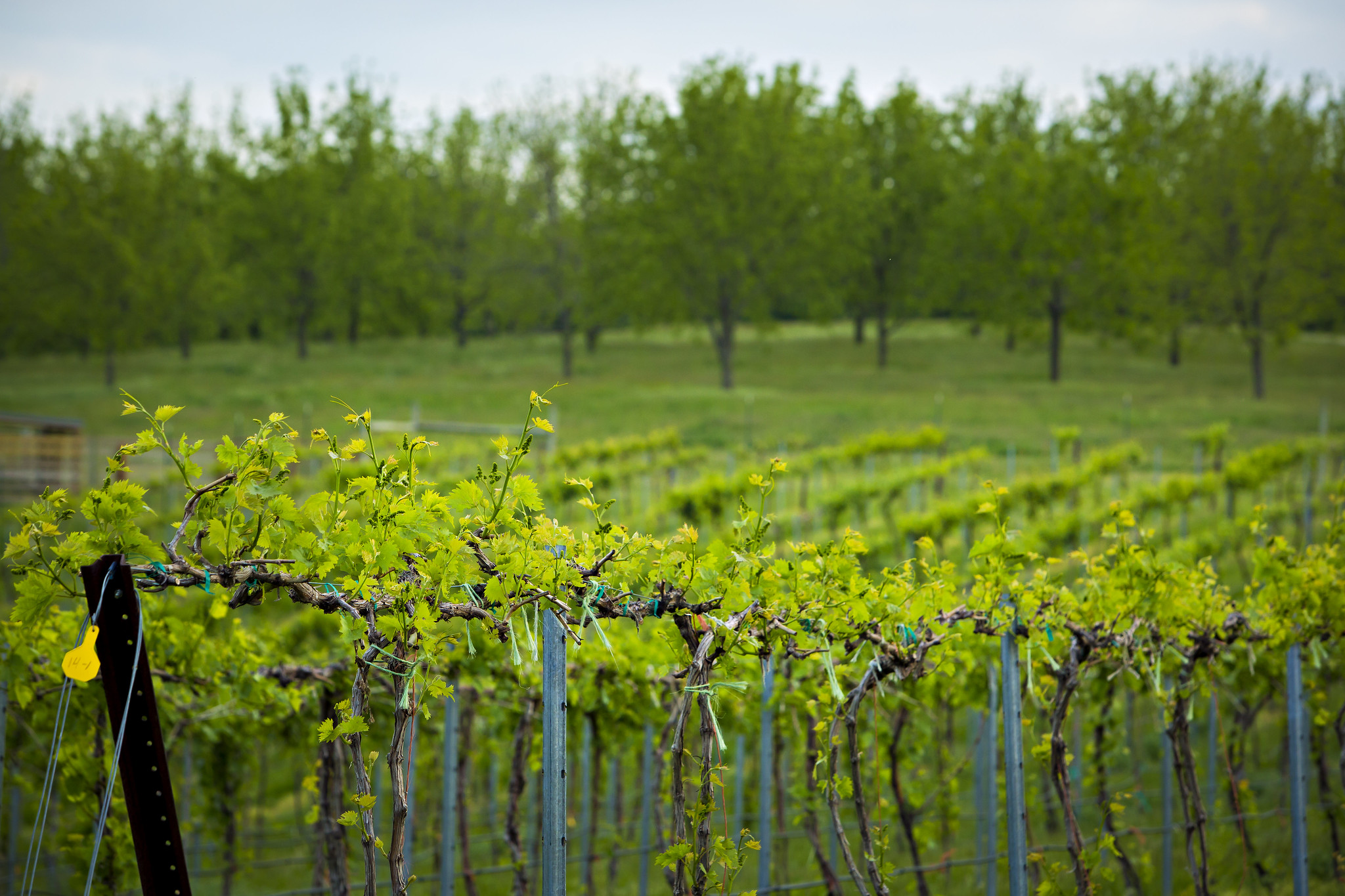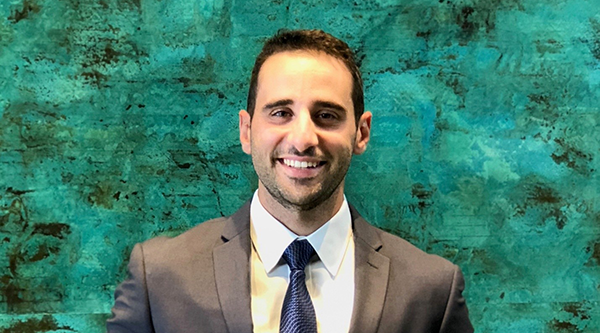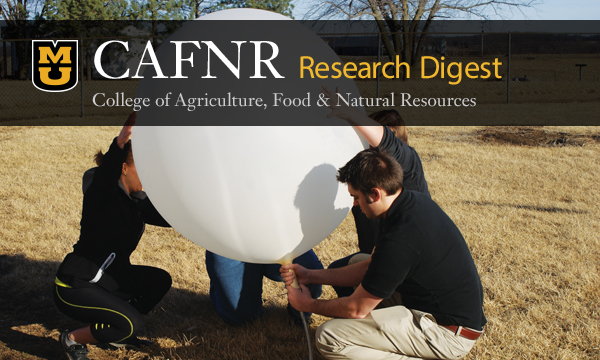|
CAFNR Office of Research Newsletter // May 23, 2019 |
|
Agricultural Research Centers |

|
|
Horticulture and Agroforestry Research Center »
|
|
Megan Hall and Nicholas Frost will explain and demonstrate the establishment of a new vineyard at a Vignoles Vineyard Field Day at the Horticulture and Agroforestry Research Center, in New Franklin, on Friday, May 31. The field day begins at 1 p.m. Topics covered will include cost implementation to the best wine grape varieties. Come learn how to plant vines and install trellises. Read more >> |
|
|
Graduate Student Spotlight |

|
|
Caio Canella Vieira, Plant, Insect & Microbial Sciences and NAPB Borlaug Scholar
|
|
What is the Borlaug Scholars Program?
The NAPB Borlaug Scholars program is an initiative by the National Association of Plant Breeders (NAPB) and the Agronomic Science Foundation (ASF) to prepare students aspiring to a career in the field of plant breeding and genetics. Besides the award, selected scholars will participate in a professional development mentoring program that connects them with experienced NAPB professional members in both academia and industry. Scholars were selected from an impressive field of nominees with strong recommendations from professors and advisors through a rigorous national competition. What is your research focus?
My master’s thesis focus is to better understand the resistance of soybeans to Southern root-knot nematode. The goal is to identify novel sources of resistance, as well as to assess the performance of resistance genes under high nematode pressure. Besides my thesis, I am a member of the Fisher Delta Center Soybean Breeding program. Our program develops soybean cultivars containing a wide range of important traits, including biotic and abiotic resistance, improved seed quality attributes, and value-added specialty varieties for food and feed markets. I participate in multiple phases of our cultivar development pipeline, including overall project management, selection of superior genotypes, and data analysis. Why does this field interest you?
Early in high school, I was introduced to the soybean expansion to the Brazilian Cerrado through plant breeding, a fascinating work led by Dr. Romeu Kiil. The Cerrado now represents one of the most productive soybean areas in the world and is responsible for more than 60 percent of the Brazilian soybean production. His outstanding accomplishments inspired me to pursue a degree in agronomy, where early in freshman year I got involved in soybean breeding research. With an alarming number of around 800 million people facing malnourishment and hunger, I believe that improving soybean, a crop which has about 40 percent of high-quality protein, represents a valuable tool to fight hunger. Why did you decide to come to Mizzou?
Mizzou has a historical strong reputation in plant science. The department has world-renowned faculty, and we have one of the most consolidated and competitive public soybean breeding programs in the United States. The opportunity to not only be part of that but also actively contribute to advance the program even further motivated me to come to Mizzou. Who is your advisor?
Dr. Pengyin Chen. He is the David Haggard Endowed Chair Professor in Soybean Breeding at the Fisher Delta Research Center in Portageville. What are your future career plans?
This summer I am working at Bayer Crop Science in the Plant Breeding division. Upon completion of my studies, my goals are to transition from academia to industry as a plant breeder, and later assume leadership roles within the company. Due to my international background, my ultimate goal is to oversee the company’s international activities, including long-term breeding objectives, and cultivar development and commercialization. My short-term career plan is to complete my master’s program and then start my PhD studies. My goal as a future PhD student is to better understand mechanisms to improve food-related traits in soybean, such as amino acid, oil and carbohydrate profile, protein content, micronutrients enhancement, and genes regulating isoflavones content. |
|
|
Research Roars |
|
Soybean Innovation Lab Crop Thresher Honored at Major International Design Contest
SAYeTECH Ghana, an implementing partner to the University of Missouri Soybean Innovation Lab (SIL), took second place in the American Society of Mechanical Engineers (ASME) annual Innovation Showcase (ISHOW), held in Nairobi, Kenya, on May 10. Jeffrey Appiagyei, CEO of SAYeTECH, presented a multi-crop thresher that SIL and SAYeTECH developed and promote for smallholder farmers across Africa. Kerry Clark, research assistant professor in the Division of Applied Social Sciences and head of mechanization development for SIL, advises SAYeTECH and collaborates with them to provide training for local blacksmiths to fabricate and sell the threshers. In 2018-19 they provided training in Ghana, Uganda, Malawi, Tanzania, and Burundi. Plans are being made for introducing the thresher to Ethiopia, Zimbabwe, Kenya, Rwanda, and Mali.
CAFNR faculty members have received the following recent grants (listed by Principal Investigator):
James English, Acquisition of Goods and Services, 4/1/2019 – 3/31/2020, $10,560, USDA Agricultural Research Service
Carol Lorenzen, Intergovernmental Personnel Agreement, 4/28/2019 – 4/28/2020, $117,334, USDA
Andrew Scaboo, SCN Screening for MO Breeding Programs, 4/1/2019 – 3/31/2020, $110,000, Missouri Soybean Merchandising Council
Kenneth Schneeberger, University of Missouri Trade Africa Implementation, 4/25/2017 – 7/31/2019, $34,000, USDA Foreign Agricultural Service
Michael Stambaugh, 500 years of longleaf pine growth and fire events in the Baker Woods of Ichauway, 4/1/2019 – 3/31/2020, $32,361, Joseph W. Jones Ecological Research Center
Jeffrey Wood, Missouri Ozark AmeriFlux (MOFLUX) Project Phase Four, 10/3/2016 – 9/30/2019, $84,925, Oak Ridge National Lab
Provided by the MU Office of Research
|
|
|
Please Join Us |
|
The College of Agriculture, Food and Natural Resources presents a talk by J. Scott Angle, Director of the USDA National Institute of Food and Agriculture and a CAFNR alumnus, on Tuesday, June 25. Dr. Angle will speak on “Balancing Land Grant Capacity with NIFA Opportunities – A Delicate Dance” at 2 p.m. in Monsanto Auditorium, Bond Life Sciences Center. His talk will be followed by a Q&A.
Dr. Angle was sworn into office as the third director of the National Institute of Food and Agriculture on Oct. 29, 2018. He received his BS and MS at the University of Maryland in agronomy and soil science, respectively. He obtained his PhD, from the University of Missouri with an emphasis on soil microbiology. Angle worked for 24 years as a professor of soil science and director of the Maryland Agricultural Experiment Station and Maryland Cooperative Extension at the University of Maryland. His early work focused on the study of losses of nutrients from agro-ecosystems, and their impact on the Chesapeake Bay. He also studied the impact of heavy metals on the food chain with the goal of protecting our food supply from these harmful elements. Later he concentrated his studies on phytoremediation, the use of plants for extraction of heavy metals from soil. In 2005, he moved to Athens, Georgia, where he served as Dean and Director of the College of Agricultural and Environmental Sciences at the University of Georgia for 10 years. Most recently, he served as President and CEO of the International Fertilizer Development Center (IFDC), where he oversaw a staff of 800 and coordinated development projects in diverse regions of the world.
|
|
|
Funding Agency News |
|
Grant Writing Tip |
|
Include a Need Statement in the first paragraph of your project narrative. It should:
- Align with the sponsor’s funding opportunity;
- Communicate your experience with the subject area; and
- Include several concise, but compelling, anecdotes illustrating the need for the project.
Then outline the impact that your proposed project will have on the area of need. Be sure the impact aligns with the agency goals. Balance specificity with realism.
|
|
|
Grants Training for USDA Predoctoral and Postdoctoral Fellowships |
|
The USDA Education and Workforce Development (EWD) Program provides fellowships for predoctoral candidates and postdoctoral scholars. They are seeking applications for preparing technology and data-savvy workforce in education, research, extension, farming and industrial sectors.
The Predoctoral Fellowships provide up to $60,000/year for up to three years. Up to $35,000 of that is stipend and the rest is for tuition and supplies. Candidates for this fellowship must be a citizen, national or permanent resident of the U.S. and have advanced to candidacy by July 18, 2019.
The Postdoctoral Fellowships provide $82,500/year for two years to cover salary, fringe benefits, and supplies. Candidates for this fellowship must have received their doctoral degree no earlier than Jan 1, 2016, and no later than April 18, 2020. They must be a citizen, national, or permanent resident of the U.S.
The CAFNR Research Development Team is offering a workshop to help those who wish to submit a proposal to this funding opportunity on May 31, 2019, from 10-11:30 a.m. in 104 Anheuser-Busch Natural Resources Building.
If you’re interested in attending this workshop, please email Sheryl Koenig at koenigsh@missouri.edu and Liz Bent at benteo@missouri.edu so we can be sure to have enough doughnuts for those attending.
|
|
|
In the News |
|
|
|
|
|
|
|
|
